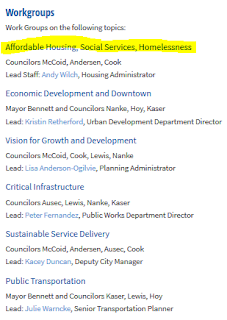Revised: January 2019
By Sarah Owens and Michael Livingston
As of the end of March, there were more than 9,700 families on the Salem Housing Authority's waiting list for Section 8 Housing Choice Voucher assistance.
The majority of households on the list include children, and more than 90% have less than $20,000 annual income. Because the list is so long (the oldest application is from 2014), SHA undertook recently to conduct a "purge." That entails notifying all households on the list to renew their application in writing.
Those who don't reply by April 10 (because, say, they've not kept their mailing address current, or they're no longer seeking a voucher) will be removed from the list. By the end of April, SHA should have a more realistic picture of just how many households are currently seeking vouchers. According to SHA staff, the list has not been purged for many years (>15).
 |
| Strategic Plan Workgroups |
There is no plan to coordinate the work group with the work of the MWHI "Transition Team", which is holding a meeting at the MWV Council of Governments on April 20. Meeting invitees include Janet Carlson, Cathy Clark, Mike Ainsworth (COG Chair), Jon Reeves, Shaney Starr, Chuck Bennett and Steve Powers.
At the Legislature: HB 2240 proposes to eliminate landlords' ability to evict problem tenants on 30 days' notice. The Salem City Council's legislative committee recommended opposing HB 2240 on the advice of the Salem Police Department. The law would also make it more difficult to persuade landlords to rent to "hard-to-house" tenants like the ones that will be targeted by the SHA's proposed Homeless Housing Assistance Program (HRAP). However, at the Council meeting on March 27, the Council failed to agree, and so did not take a position one way, or the other. Some say HB 2240 has no chance of passing, so it doesn't much matter. The bill is still in committee.
 |
| 2016 Citizens Budget Committee |
It's the City's first big commitment to permanent supportive housing, it's the beginning of a coordinated entry system, it's expansion of the use of ServicePoint, it's the early beginnings of a coalition of service providers to the homeless, it's hopefully the beginning of a culture shift in the community's approach to homelessness, and it's the groundwork that will allow the area to form a CoC independent of ROCC.
In other words, HRAP is or could be the beginning of a systemic approach to our problems of homelessness. It's going to require a genuine commitment from the community, so everything needs to be above board, because people need to understand the challenges, so expectations can be managed.
Finally, the Urban Development, Community Services and Housing Commission (CSHC) is planning to take a refresher course on what's commonly referred to as diversity and inclusion, after certain inappropriate remarks were made about the Latino Microenterprise Program during the course of their deliberations on how the City should allocate 2017 CDBG, HOME and General Fund grants. Commission Member Curt McCormack's question/comment:
One of the things that troubled me...are they training these folks to have a business in Mexico? And I ask that because they're mainly teaching in Spanish, and if they're going to have a business here, maybe you can help me understand this [directed to the only Latino member of the Commission], if they're going to have a business in Salem, I think they would really need to learn English. One of the problems I have at the food bank, and out of necessity I've learned some phrases, but I see the same families coming in, over and over again, and they refuse to learn English.
The other Commissioners sat silent while Arturo Vargas, their only Latino member, "put on" his "Mexican-American hat" (as he put it) and responded patiently to McCormack. None of the other commissioners was willing to confront McCormack on his racism (some would say subtle racism). The decision to take a refresher course, including coaching on how to confront subtle forms of racism effectively in public forums, came only after a complaint from the public (us).

No comments:
Post a Comment